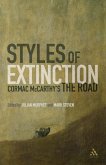The Ethics of Community initiates a conversation between continental philosophy and cultural/literary studies that is long overdue. Illustrating that there is a fundamental ethics in deconstructionist approaches to community that can be provocatively traced in the context of cultural considerations central to African-American and U.S. Latino literature, this is a book about bridging gaps.
Luszczynska nimbly traverses the complex terrain of preeminent French philosophers Jacques Derrida and Jean-Luc Nancy, offering a valuable introduction to the ethical components of their philosophical projects. Toni Morrison's Beloved and Ana Menendez's In Cuba I Was a German Shepherd serve as case studies through which Nancian community and Derridean bearing witness are elaborated. As Luszczynska demonstrates, Morrison's foregrounding of the distinct cultural sensibilities of her black and white characters and Menendez's preoccupation with geographical displacement and exile, themselves activate a deconstructive ethics. In this groundbreaking study, distinct cultural understandings and contexts provide a novel way of thinking through intricacies of Nancy and Derrida's thought while revealing the potential of the novel to re-imagine ways of being in the concrete world.









